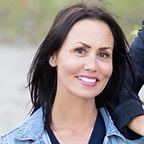“He Shouldn’t Be In Here — PART 3"
BLOG 88/365
I had cared for my birth mother Rose from the time when we first met. She had been a ward of the state since childhood and in her adult life she remained in the ‘loop’ of psychiatric care. I became her designated Temporary Decision Maker, amongst other things.
I’d be lying if I said it was easy being in my early 20’s caring for my birth mother in that capacity. We were a young family, I had my own personal and health issues to deal with and I was now riding on a new and very steep learning curve trying to learn more about diagnoses and medications.
Navigating the many systems I needed to fumble through was no short of a partial train wreck. Many of the organizations and people were not welcoming, easy or transparent to deal with though gratefully I did learn a plethora of new skills and education to serve those living with mental illnesses.
Unfortunately, and too often in situations such as mine was at the time, individuals and their families aren’t heard, they fall through the cracks, they are brushed off, taken advantage of, not taken seriously and you regularly want to bang your head against the wall. You regularly want to take some sort of giant sword and cut through the relentless thick and stupid red tape.
As mentioned of my time caring for Rose, I had learned a LOT about severe and multiple psychiatric challenges, triggers and behaviours.
When I got the call from the jail one night, the employee calling was confused and decently distraught as to why my Dad Howie was in there. “He shouldn’t be in here”, continued the man, “I have worked in these settings for years and your Dad is not mentally well, he needs to be in care not in jail. Why is he in here?”.
The conversation with this individual went on in confidentiality for a while. We went back and forth on the fact that I knew what he meant and I and other family had tried to help and do things to keep him from going in there.
His charge wasn’t much and upon detainment should have been assessed for mental health challenges…as I had previously tried to tell his doctor and others on a few occasions.
“Oh, it’s Howie…he’s just like that, I’ve worked with him for years”. But I (and some of the family) knew his behaviour was becoming different and he wasn’t making normal decisions. He began forgetting how to use a toothbrush and other simple things.
I knew from helping and caring for my birth mother who battled with schizophrenia, manic depression, early onset dementia and early onset Alzheimer’s that Howie’s new behaviours were not due to his alcohol use as the professionals so wrongly assumed. We needed to be heard and he needed to be helped.
I can’t remember the exact details around his incarceration but I vividly remember the said employee being extremely concerned for his health and life while wrongly and dangerously kept in that place. I am forever grateful to that individual who attempted to advocate for him and cared enough to risk a lot of things to call me and share the reality of his concerns about the situation.
“He shouldn’t be in here.”…
- — — — — — — — — — — — — — — — — — — — — — — — — -
“More than 30% of inmates in Canadian prisons are Indigenous — even though aboriginal people make up just 5% of the country’s population, according to new figures released by a federal watchdog.
“In a scathing report published on Tuesday, the correctional investigator of Canada, Dr Ivan Zinger, described Indigenous overrepresentation in the country’s jails and prisons as “nothing short of a national travesty”.
“Numerous factors — including poverty rates and racism in policing — contribute to the imbalance in convictions.”
“And once in detention, Indigenous people face another set of systemic inequities: Indigenous offenders are more likely to be sent of maximum-security facilities and are disproportionately the recipients of harm, both self-induced and in incidents involving “use of force”. They are also much more likely to be placed in solitary confinement.” — theguardian.com (Jan. 2020)
Yes, my Dad Howie faced some challenges but who wouldn’t walking the journey he did?
He loved people. He loved life. He loved his community. He loved his family.
He passed away having been able to proudly walk the last while of his life sober.
I will always remember the times when he called and repeatedly told me; “Jesus took my drinking away”.
For someone who endured the things he did, Howie left this world a better place and indeed left his mark with everyone he met.
The season of radical change is long overdue.
C’mon…change can happen.
It IS possible and it is possible to walk both in justice and in love.
Will you work along side me on these and remember to:
Hear, listen, wait, pause before acting, look at the big picture, stop assuming, stand up, act, respond…not react, …love first.?
-Becky
